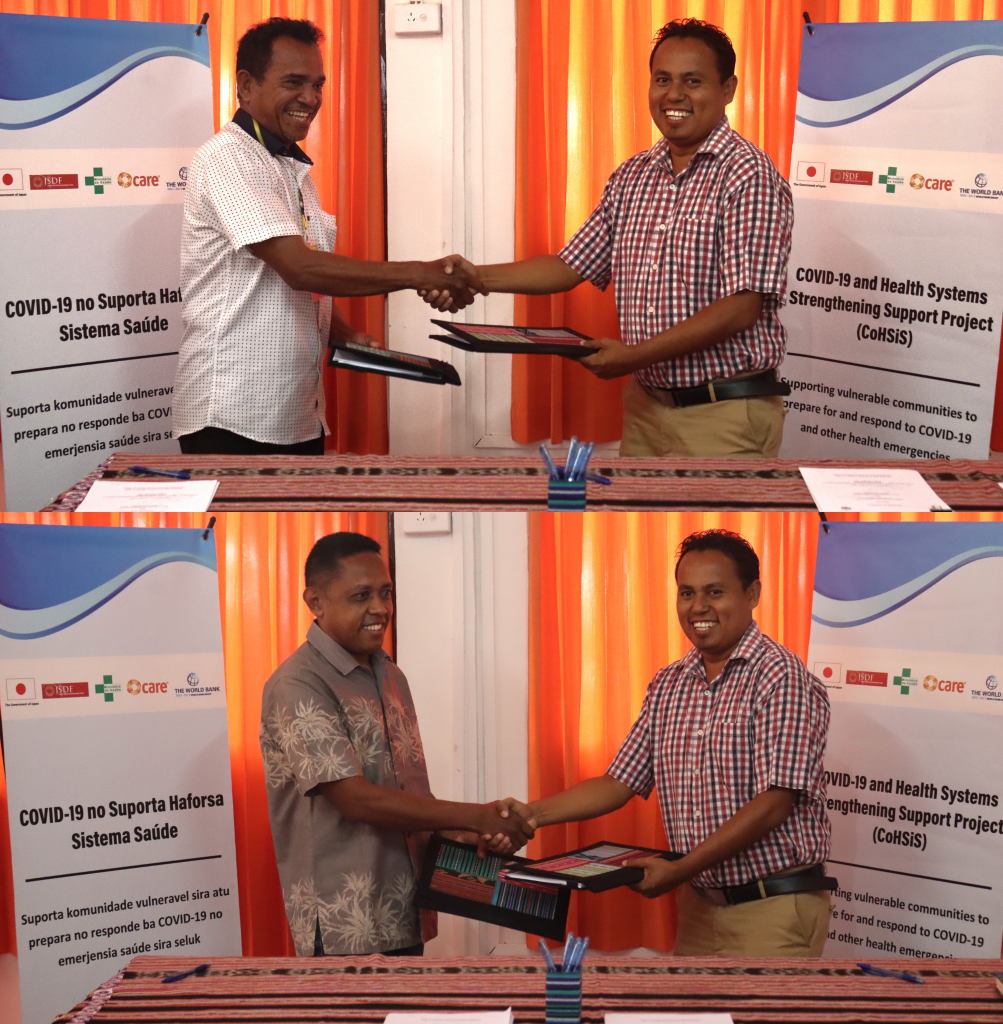CARE signs partnership agreements with local actors to strengthen health services and increase rural communities’ preparedness and response to health emergencies

KOMUNIKADU IMPRENSA
CARE asina akordu parseria ho ator lokal sira atu hametin servisu saúde no haforsa komunidade rural sira nia preparasaun no responde ba emerjensia saúde
Dili, 02 Otubru, 2023 – Pandemia hanesan COVID-19 hatudu ona oinsá sistema saúde no servisu sira ne’ebé mak vulneravel bele fó implikasaun perigu ba saúde, progresu ekonómia no oportunidade atu sustenta moris, liu-liu ba feto rural sira ne’ebé mak hetan impaktu nanis ona husi dezigualdade estrutural. Bainhira Timor-Leste rekupera husi pandemia ne’e, sistema saúde sei difikulta atu hatan ba nesesidade saúde sira seluk.
Iha 2022, Japan Social Development Fund (Fundu ba Dezenvolvimentu Sosial Japaun) ho parseria hamutuk ho Banku Mundiál fundu projetu COVID-19 and Health Systems Strengthening Support (COVID-19 no Suporta Haforsa Sistema Saúde), ne’ebé mak implementa ona husi CARE to’o 2025. Projetu ne’e iha objetivu atu asegura efetividade iha implementasaun planu ba preparasaun no responde ba COVID-19 no emerjensia saúde sira seluk iha nivel baze ho intervensaun foka ba setor saúde, nutrisaun, no bee, saneamentu, no ijiene.
Ohin loron, CARE asina akordu parseria ho Knua Haberan Comunidade (KHC) no Asosiasaun Rede Covalima (ARC) ho objetivu atu integra aproximasaun Kartaun Valor Komunidade (Community Score Card) ba projetu ne’e. KHC sei implementa atividade ne’e iha Viqueque no sei kobre suku 11, no ARC iha Covalima, kobre suku 7. Ho koneksaun no peritu lokal, organizasaun rua ne’e sei servisu besik ho parte interesada xave sira iha setor saúde atu asegura katak komunidade rural sira sei hetan suporta ba sira nia utilizasaun no asesu ba servisu saúde komunitariu sira atu haforsa sira nia preparasaun no responde ba saúde emerjensia.
CARE nia servisu iha Timor-Leste uza aproximasaun Kartaun Valor Komunidade hanesan dalan ida atu asegura servisu públiku sai sensivel ba jéneru no inkluzivu, no mos akontabilidade no transparénsia entre utilizador servisu, fornesedor servisu no foti dezisaun nain sira. Ho ami nia projetu anterior sira ne’ebé foka ba saúde, ami haree ona oinsá Kartaun Valor Komunidade lori mudansa ba feto rural no remotas no sira nia komunidade ho sira nia asesu no utilizasaun servisu saúde. Aproximasaun ida ne’e ne’e nu’udar instrumentu partisipativu ida ne’ebé la’o ho dalan rua no iha kontinuasaun, uza ba halo asesmentu planeamentu, monitorizasaun no avaliasaun ba servisu – aproximasaun ne’e halibur hamutuk parte ezijénsia (ema sira ne’ebé uza servisu) no fornesimentu (fornesedor servisu) husi servisu ka programa espesífiku ida atu avalia kolaborativamente dezafiu sira bazeia ba prestasaun servisu no identifika solusaun mutú ba asuntu espesífiku ida.
Ho akordu parseria rua ne’e, ami iha objetivu atu replika impaktu husi esperiénisa uluk ho eskala boot, foka ba redus komunidade rural no remotas iha Viqueque no Covalima sira nia vulnerabilidade ba impaktu sira husi krize saúde.
#Remata
PRESS RELEASE
CARE signs partnership agreements with local actors to strengthen health services and increase rural communities’ preparedness and response to health emergencies
Dili, 02 October, 2023 – Pandemics such as the COVID-19 has shown how vulnerabilities in health systems and services can have serious implications on health, economic progress and livelihoods, particularly on rural women who are already impacted by existing structural inequalities. As Timor-Leste recovers from the pandemic, the already stretched health system struggles to accommodate other needs.
In 2022, the Japan Social Development Fund in partnership with the World Bank funded the COVID-19 and Health Systems Strengthening Support (CohSiS) project, which has been rolled-out and implemented by CARE until 2025. The project aims to ensure effective implementation of national COVID-19 and general public health emergency preparedness and response at the grass roots level with focus interventions in the sectors of health, nutrition and water, sanitation, and hygiene (WASH).
Today, CARE signs agreements with Knua Haberan Comunidade (KHC) and Asosiasaun Rede Covalima (ARC) to incorporate the Community Score Card tool into the project. This activity will be carried out by KHC in Viqueque, covering 11 suku, and by ARC in Covalima, covering 7 suku. Equipped with local connection and expertise, these two organisations will collaborate closely with key stakeholders in the health sector to ensure that rural communities are supported through the utilisation and access to community health services to enable them to strengthen their preparedness and response to health emergencies.
CARE’s work in Timor-Leste has been scaling up the use of the Community Score Card tool as the means to ensuring public services are gender equitable and inclusive, as well as accountability and transparency among service users, providers and decision makers. In our past health-focus projects, we have seen how the Community Score Card changed the lives of the most rural and remote women and their communities in their access and utilisation of health services. The community Score Card is a two-way and an ongoing participatory tool for service assessment, planning, monitoring, and evaluation – it brings together the demand (service users) and supply (service providers) sides of a specific service or programme to collaboratively assess the underlying service delivery challenges and identify a common and shared solution to those issues.
With these partnership agreements, we are aiming to replicate the impact of previous experiences at a larger scale, focusing on reducing the vulnerability of rural and remote communities in Viqueque and Covalima to the effects of health crises.
#End
